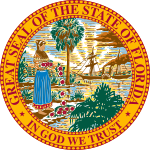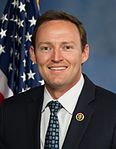| |||||||||||||||||
| |||||||||||||||||
Rubio: 40–50% 50–60% 60–70% 70–80% 80–90% >90% Murphy: 40–50% 50–60% 60–70% 70–80% 80–90% >90% Tie: 40–50% 50% No votes | |||||||||||||||||
| |||||||||||||||||
| Elections in Florida |
|---|
 |
|
|
The 2016 United States Senate election in Florida was held November 8, 2016 to elect a member of the United States Senate to represent the State of Florida, concurrently with the 2016 U.S. presidential election, as well as other elections to the United States Senate in other states and elections to the United States House of Representatives and various state and local elections. The primary elections for both the Republicans and Democrats took place on August 30, 2016.[1]
Incumbent Republican Senator Marco Rubio ran for another term but faced well-funded Republican primary opposition after initially announcing he would not seek re-election to his Senate seat. He had openly considered whether to seek re-election or run for president in 2016.[2][3][4] He stated in April 2014 that he would not run for both the Senate and president in 2016, as Florida law prohibits a candidate from simultaneously appearing twice on a ballot, but did not rule out running for either office.[5]
However, in April 2015, Rubio announced that he was running for President and would not seek re-election.[6][7][8][9] Rubio had initially said he would not run for re-election to the Senate even if he dropped out of the GOP presidential primary before he would have to qualify for the 2016 Senate primary ballot, for which the filing deadline was June 24, 2016.[10][11]
On June 13, 2016, despite his previous statements that he would not run for re-election to his Senate seat, Rubio "seemed to open the door to running for re-election," citing the previous day's mass shooting in Orlando and how "it really gives you pause, to think a little bit about your service to your country and where you can be most useful to your country."[12] On June 22, 2016, Rubio announced that he would seek re-election to the Senate, reversing his pledge not to run.[13]
On August 30, the Republican Party nominated Marco Rubio, and the Democratic Party nominated Representative Patrick Murphy. Rubio won with the largest raw vote total in Florida history (until Donald Trump broke the record in 2020), taking a greater percentage of the popular vote than Republican presidential nominee Donald Trump, who won the state in the election. He is the first Republican Senator from Florida since 1994, and only the second with Connie Mack, to be reelected to a second term. Also, with Mel Martinez's victory in 2004, this marks the first time that Republicans have won one of Florida's Senate seats three times in a row (Mack succeeded Lawton Chiles, a Democrat, and was succeeded by another Democrat, Bill Nelson).
Marco Rubio won 48% of the Hispanic vote and 17% of the African American vote during this election, an exceptional number for a Republican during a presidential year.[14] Additionally, Rubio's raw vote total was the highest vote total for any Republican Senate candidate up until Texas Senator John Cornyn broke it in 2020.
- ^ "2016 Election Day Dates".
- ^ Rubin, Jennifer (August 5, 2013). "Prepping for 2016: Marco Rubio". The Washington Post. Retrieved August 5, 2013.
- ^ Feldmann, Linda (September 4, 2013). "2016 contenders: Why Syria is tough for GOP's Marco Rubio". The Christian Science Monitor. Washington. Retrieved September 7, 2013.
- ^ Sink, Justin (September 6, 2013). "Rubio to tackle future of US, GOP". The Hill. Retrieved September 7, 2013.
- ^ Berman, Matt (April 2, 2014). "Marco Rubio Won't Run for Senate in 2016 if He Runs for President". National Journal. Retrieved April 2, 2014.
- ^ Parker, Ashley (April 13, 2015). "Marco Rubio Announces 2016 Presidential Bid". The New York Times.
- ^ "Marco Rubio tells donors he's running for president in 2016". CBS News. April 13, 2015. Retrieved April 13, 2015.
- ^ Steve Benen (April 13, 2015). "Marco Rubio rolls the dice". MSNBC. Retrieved April 13, 2015.
- ^ David M. Drucker (April 13, 2015). "Marco Rubio jumps in, will leave Senate". The Washington Examiner. Retrieved April 13, 2015.
- ^ "United States Senate election in Florida, 2016". Ballotpedia. Retrieved November 26, 2015.
- ^ Marco Rubio [@marcorubio] (May 17, 2016). "I have only said like 10000 times I will be a private citizen in January" (Tweet) – via Twitter.
- ^ LoBianco, Tom (June 13, 2016). "Citing Orlando shootings, Rubio opens door to Senate run". CNN. Retrieved June 13, 2016.
- ^ DeBonis, Mike; O'Keefe, Ed; Sullivan, Sean (June 22, 2016). "Marco Rubio will seek Senate reelection, reversing pledge not to run". The Washington Post. Retrieved June 22, 2016.
- ^ "How Rubio outdid Trump in Florida and revived his career". Politico PRO. Retrieved August 26, 2017.
© MMXXIII Rich X Search. We shall prevail. All rights reserved. Rich X Search





